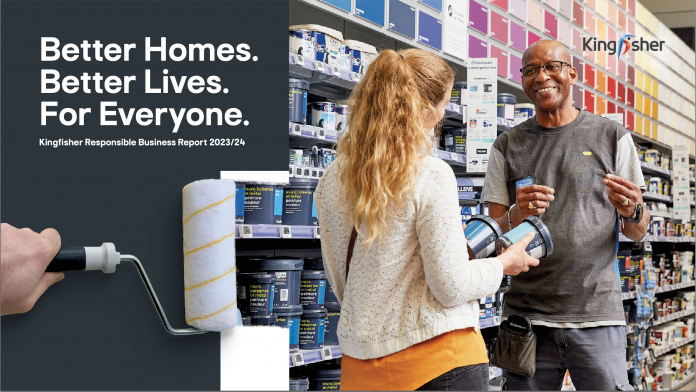Kingfisher, the international home improvement company, has today announced new science-based emissions targets across Scopes 1, 2 and 3, as part of the next stage of its Net Zero Climate Plan.
The Group aims to reduce absolute Scope 1 and 2 emissions by 68% from a 2016/17 base year by 2030, and to reach Net Zero by FY2040. For Scope 3, the Group aims to reduce absolute emissions by 46% from a 2017/18 base year by 2030, and to reach Net Zero across the value chain by FY2050. The targets have been submitted for validation by the Science-Based Targets Initiative (SBTi).
The Group has a detailed action plan in place to achieve these targets, building on its strong track record of delivering emissions reductions to date. This includes:
- Developing/moving towards zero carbon stores;
- Decarbonising logistics operations;
- Improving energy efficiency of products and transitioning away from fossil fuel-using ranges;
- Using lower carbon materials in purchasing criteria and product design;
- Engaging vendors to drive and monitor upstream carbon reduction; and
- Building circularity into business models including through the rental and refurbishment of products.
In June 2024, the Group announced it had reduced Scope 1 and 2 emissions by 62% since 2016/17, exceeding its 2025/26 target of 37.8%. Scope 3 emissions reduced by 41.6% per £m of turnover since 2017/18, exceeding the previous 2025/26 target of 40%.
Thierry Garnier, Kingfisher CEO, said: “These new targets toward Net Zero demonstrate our continued commitment to reducing our environmental impact and will be a driving force for all our teams over the coming years. From electrifying in-store heating to improving the energy efficiency of our products, we have made strong and fast progress so far, but we know we still have a significant journey ahead towards net zero.
“We won’t achieve this alone. We will continue to collaborate with all our vendors in their own decarbonisation journeys, as well as engaging with all stakeholders across our value chain to deliver our commitments. Part of this is also our continuous support to EDRA/GHIN, the global home improvement trade bodies, in fostering greater collaboration and innovation across our industry to drive down Scope 3 emissions.”
Kingfisher’s further Scope 3 emissions reductions are supported by its Sustainable Home Products (SHP) programme. One of the aims of the programme is to reduce the carbon emissions embodied in products from extracting materials and manufacturing, as well as those emitted when customers use and dispose of products. SHPs represented £6.4bn of sales for Kingfisher in 2023/24, accounting for 49% of Group sales and 60% of Own Exclusive Brand (OEB) sales.
In addition, in June 2024, Kingfisher announced that it is setting ambitious common targets with its vendors towards decarbonisation. For example, for its 100 largest vendors by Scope 3 emissions, the target is to create a SBTi aligned roadmap and decarbonisation target by 2028. Kingfisher will collaborate with its vendors to support their progress towards the targets, including sharing training and expertise.
Kingfisher’s Responsible Business strategy focuses on four priorities – where the company can use its scale and influence to bring about positive change: becoming a more inclusive company; helping to tackle climate change and moving towards becoming Forest Positive; helping to make greener and healthier homes more affordable; and striving for better homes for everyone in our communities.




